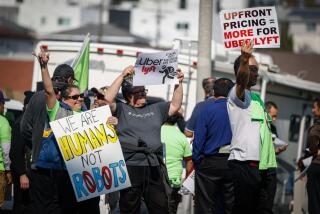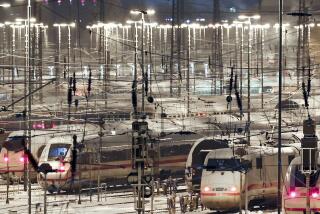Rail Strikes Strand Commuters in New York, Chicago
- Share via
A rail strike in New York City’s northern suburbs forced 95,000 commuters to find another way to get to work Friday, and a railroad strike in Chicago disrupted evening rush-hour service despite a bill signed by President Reagan to impose a settlement.
The New York-area employees returned to work under court order hours after the strike began. Legislation to force the Chicago workers to do the same was passed by Congress on Friday afternoon, but not in time to prevent a delayed evening rush hour.
Refusal to Work Overtime
The strike by 780 track workers on New York’s Metro-North Commuter Railroad was prompted by the suspension of 37 employees Tuesday for refusing to work overtime, the Teamsters Union said. It said forcing tired workers to continue on the job could be dangerous.
Other unions quickly honored the Teamsters’ picket lines, shutting down the line and catching morning commuters in Connecticut and New York’s northern suburbs without warning.
“The train problem today is a surprise to me,” Jim Grant said at the South Norwalk, Conn., train station. “I wasn’t even listening to radio or TV.”
The strike was halted after U.S. District Judge Inzer B. Wyatt ordered the Teamsters back to work. He set a hearing for Monday on whether to issue a permanent injunction.
Layoff Notices Posted
In Chicago, 2,600 United Transportation Union workers struck the Chicago & North Western railway Friday morning when the railroad’s parent company began posting layoff notices eliminating 1,150 brakemen’s jobs.
The strike could have begun just after midnight, when a federally mandated cooling-off period expired. But the company and union had agreed to hold off the action until after the heaviest part of the morning rush hour.
The delay assured 41,000 commuters in the northern and western suburbs of a ride to work, but many commuters sought alternative methods of getting to work, and ridership was down about 40%.
More to Read
Sign up for Essential California
The most important California stories and recommendations in your inbox every morning.
You may occasionally receive promotional content from the Los Angeles Times.










